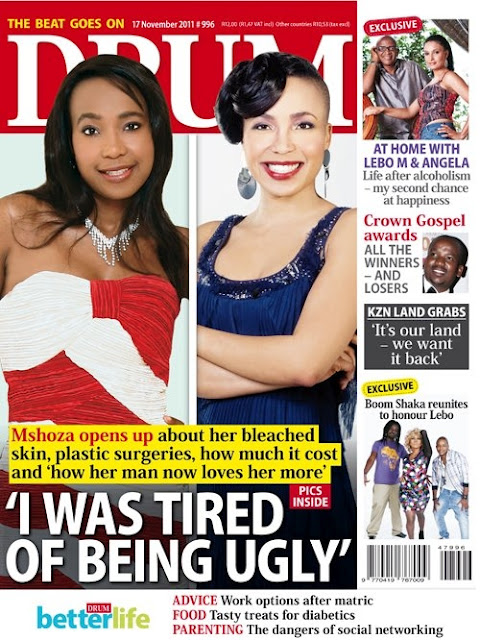
While political Apartheid ended in South Africa over 18 years ago the legacy of slavery and European colonialism has left an ugly stain of extreme low self esteem amongst South Africans, where according to a recent study by the University of Cape Town, one in three women bleach their skin.
A recent BBC article titled, Africa: Where black is not really beautiful, by Pumza Fihlani, exposed an ugly side to South Africa which discredits the fight for racial equality and freedom from European colonial rule.
A recent study by the University of Cape Town revealed that one in three South African women bleach their skin. South African singer Nomasonto Mnisi, or Mshoza, as she is most commonly known provoked controversy when she bleached her skin, but she remains defiant in what she describes as her personal choice. She told the BBC, “I’ve been black and dark-skinned for many years, I wanted to see the other side. I wanted to see what it would be like to be white and I’m happy.”
Mshoza’s view of her dark skin is shared by many Africans it seems as the World Health Organisation reported that 77% of Nigerian women use skin bleaching products regularly, followed by women from Togo 59%, South Africa, 35%, and Mali 25%.
Now, even African men are beginning to lighten their skin rejecting heritage that they were born with. Congolese hair stylist Jackson Marcelle, who has been bleaching his skin for a decade told the BBC, “I pray every day and I ask God, ‘God why did you make me black?’ I don’t like being black. I don’t like black skin.” He added, “I like white people. Black people are seen as dangerous; that’s why I don’t like being black. People treat me better now because I look like I’m white.”
The Legacy of European Racism
The legacy of European racism and colonialism is still deeply embedded in the minds of not just Africans, but also people of ethnic origin all over the world.
In my article Chris Rock deals with black hair in new documentary I dealt with the negative connotations that black hair and indeed characteristics are associated with to the point that black people attempt to remove these characteristics through products such as skin lighteners and hair straighteners. American comedian Chris Rock found it disturbing when his five-year-old daughter Lola asked him, “Daddy, how come I don’t have good hair?” This prompted him to make the documentary “Good Hair”, which I highly recommend readers to watch.
“Black women, according to researchers Mintel, are willing to spend at least double the amount on hair and beauty products that white women do. In the eight years to 2002, the market for black female beauty products grew by 48%”, says Hugh Muir. (Guardian: 3 June 2010)
Alphonso Van Marsh, in a report for CNN Health in November 2007, said, “…as the UK’s Asian, African and African-Caribbean communities grow, so too — cosmetics industry experts say — does ethnic spending power for products promoted to lighten skin tone.”
As Marsh’s article shows, skin lightening is not exclusive to Africans, Asians to are changing their appearance to look more European.
In the article Fans outraged as Elle Magazine is accused of digitally lightening Bollywood star, a Mail Online report said that skin lightening products in India is now a multi million-pound industry aimed at young Indian men and women.
In a BBC report on Tuesday, 25 September 2007, by Naresh Puri Bollywood actor Shahrukh Khan came under fire from fans and campaigners alike for promoting a skin whitening cream.
In the advert an Indian man who has darker skin than his friends has no success with women until Khan hands him a skin lightening cream.
The Contradictions of Racial Harmony
With an African-American president leading America, the media portrays a world now free of the legacy of European colonialism, but this is far from the reality as the evidence in this article shows.
If we are living in a generally racially harmonious world the need for skin bleaching would diminish, but this need is growing and points to a contradiction in race relations.
No doubt young children from African and other ethnic backgrounds will learn not to be comfortable in their own skin and this cancerous self hate will be passed on from generation to generation until we all decide enough is enough and tackle these issues head-on.
For more research:
http://www.bbc.co.uk/news/world-africa-20444798

Interesting article. I found the following Youtube video some time ago that discusses the same problem. It is 1 hour and 15 minutes long.
http://www.youtube.com/watch?v=1L2uzjWv4hI